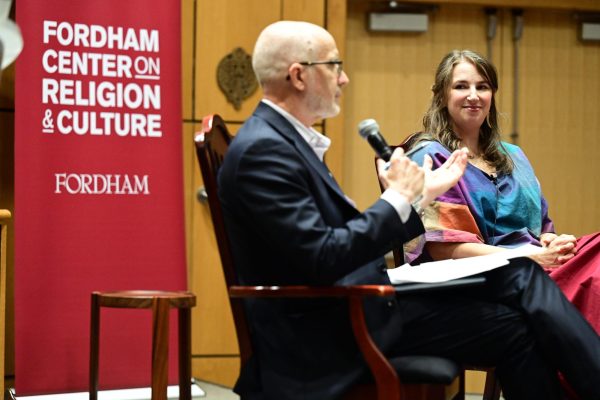Another Look at Jesuit Values and Fordham Policy
As a Jesuit Institution, Fordham University is expected to uphold traditional Jesuit values. These include forming students “intellectually, morally and spiritually towards lives of solidarity, service and professional success,” according to an explanation of Jesuit education from Xavier University.
Fordham University cites these traditional Jesuit values as the reason for its policies surrounding birth control, sex and overnight guest policies in the dorms. Despite the fact that Fordham is a Jesuit institution, many of these policies often face criticism from more progressive students within the Fordham community.
According to Fordham’s student handbook, the university “follows Church teachings on reproductive issues and acknowledges the personal and private decisions of its community members in this area.” However, the distribution of contraceptive devices and/or birth control is forbidden on Fordham property and at university-sponsored events.
As cited in the student handbook, the enforcement of these policies extends to University Health Services professionals, who will not write prescriptions for birth control unless under “limited exceptions” for the “treatment of an existing medical condition accompanied by supporting documentation.”
Resistance to the enforcement of these policies is nothing new. In 2012, the Los Angeles Times published an article about two Fordham women with pre-existing conditions who fought to have their birth control prescriptions renewed by University Health Services professionals on campus. Their medical requests were denied.
Over the summer, The Observer published an article detailing the Supreme Court decision that upholds regulations allowing “employers with religious or moral objections to limit access to birth control under the Affordable Care Act.” Despite this ruling, The Observer noted that coverage of contraceptive products and procedures remains protected by the university-issued health insurance policy from Aetna.
When asked to give their opinions of these policies in greater depth, many students specified that they were afraid to do so as their responses might affect on-campus leadership or work positions. Nevertheless, some students offered to speak out about the role these policies play on campus.
Grace Twehous, FCRH ’22, stated that Fordham’s policies “reflect the Catholic Church’s teaching on the matter which the university has a duty to uphold.” She suggested that “students who may not agree with the policy can seek other health care alternatives off campus that can provide them the services they need, without compromising the university’s moral duty.”
“I think it is reasonable for a Catholic institution to uphold Catholic doctrine, regardless of evolving public opinion or student demands for such services,” Twehous said.
While many students agree with Fordham’s Jesuit policies, Pilar Valdes, FCRH ’23, does not believe Fordham’s policies are fair and stated that “the policy is misguided and could have detrimental effects like outbreaks of STIs.”
Similarly, Vanditha Krishnan, GSB ’25, referred to Fordham’s policy as “disappointing” and in violation of “the school’s emphasis on cura personalis.”
“Contraception, especially birth control, can be expensive, and uninsured students shouldn’t need to find ways to obtain it outside of the [on-campus] health center,” Krishnan said.
In addition to Fordham’s policies on contraception, the university enforces similarly prohibitive policies when it comes to overnight guests in the residence halls. According to Fordham’s Residential Life Handbook, the university is “informed by the Jesuit Catholic tradition of responsible moral living.” Therefore, “sexual intercourse is to be reserved for marriage,” according to the handbook.
As a result of these principles, Fordham enforces the policies that “cohabitation is prohibited in the residence halls” and overnight guests must be of the same sex as the undergraduate student themselves, according to the Residence Hall Agreement.
The overnight guest policy, however, does not extend to graduate students, who are allowed overnight guests of the opposite sex.
Georgetown University, Boston College and the College of the Holy Cross, other Jesuit institutions, enforce similar policies regarding cohabitation and overnight guest policies of the opposite sex in residence halls.
While these policies exist at similar institutions such as Holy Cross, “they are not actively enforced on campus,” said Cate Longo, a senior at Holy Cross.
Other universities in New York such as Columbia and NYU do not place these same restrictions on overnight guests of the opposite sex in residence halls.
Christina Costello, GSB ’24, said she thinks these policies should be modified, citing them as “outdated and slightly controlling.”
Similarly, Claire Reynolds, FCRH ’23, said Fordham’s policies reflect “traditional views that are not inclusive.”
“These policies do not take into account the diverse backgrounds and beliefs of the student population,” Reynolds said.
One reason many students question the overnight guest policy is due to the fact that it does not equally affect or extend to graduate students and students who are part of the LGBTQ+ community.
Sydney Allen, GSB ’24, pointed out that the policy “doesn’t keep students from having overnight guests of the same sex,” leading to questions about whether Fordham is endorsing or simply disregarding the existence of same-sex relationships on campus.
Graduate students also remain unaffected by this policy. “The fact that graduate students don’t have to abide by this policy only goes to show that the real reason behind Fordham’s implementation of the policy may not be Catholic-based after all,” said Krishnan.
Despite frequent student complaints, these policies stay in place year after year. Alysha Jhaveri, FCRH ’22, said she fears that Fordham’s resistance to change these policies will have negative effects on the student body.
“I don’t think that there are enough resources to encourage safe sex practices. The health center, as well as dorms, should provide students with free contraceptives, ensuring that students are prepared if and when they chose to engage in sexual activities,” Jhaveri said.
More regular programming would “give the students the opportunity to learn more about their own reproductive health and the importance of consent,” Jhaveri said.
















































































































































































































Eric Toddy • Dec 28, 2021 at 4:55 pm
If you don’t like the school’s policies, you are welcome to leave. The school was founded in 1841. You knew what you signed up for.
– FCRH ’18